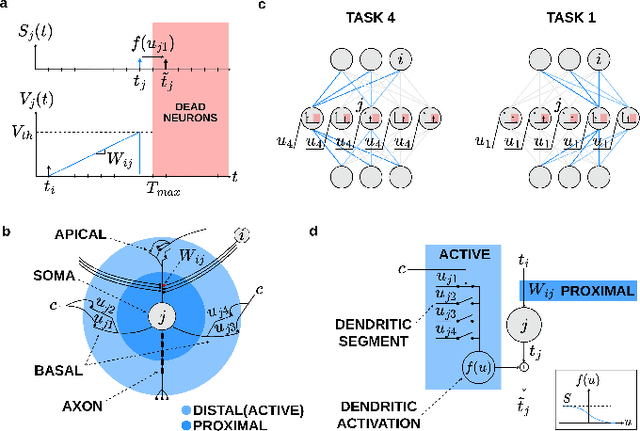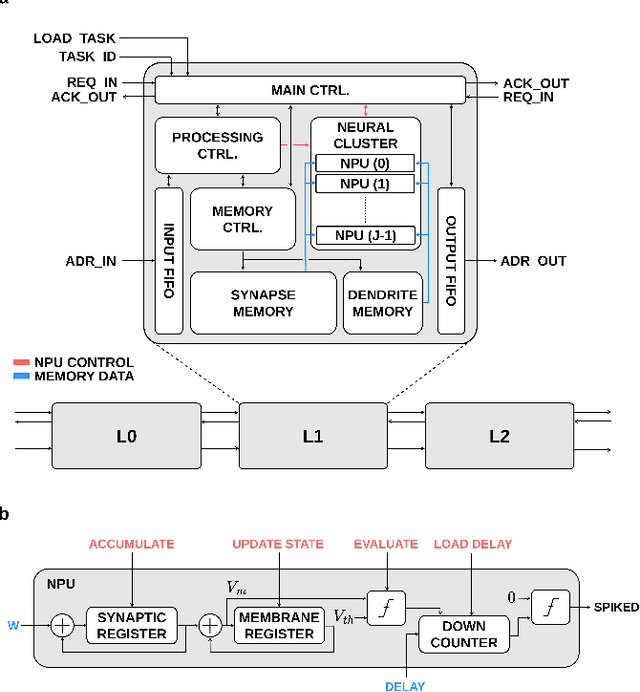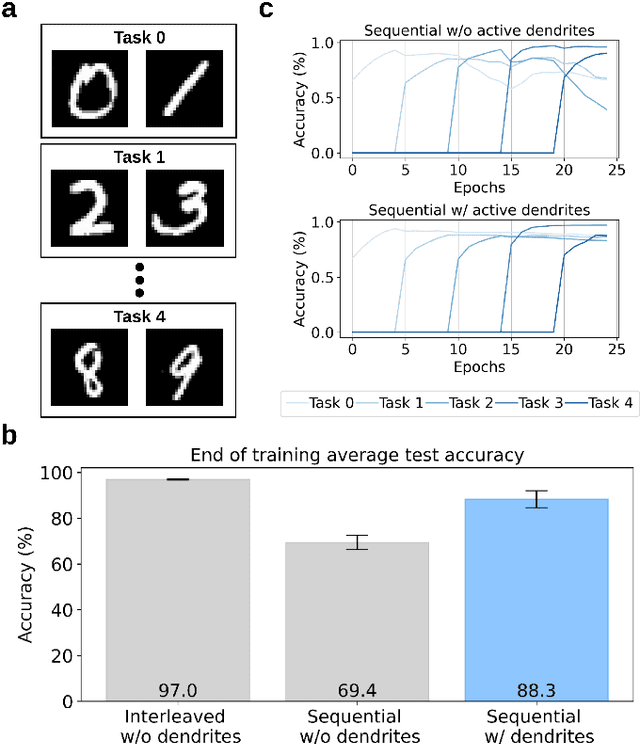Lorenzo Pes
LOKI: a 0.266 pJ/SOP Digital SNN Accelerator with Multi-Cycle Clock-Gated SRAM in 22nm
Nov 14, 2025



Abstract:Bio-inspired sensors like Dynamic Vision Sensors (DVS) and silicon cochleas are often combined with Spiking Neural Networks (SNNs), enabling efficient, event-driven processing similar to biological sensory systems. To realize the low-power constraints of the edge, the SNN should run on a hardware architecture that can exploit the sparse nature of the spikes. In this paper, we introduce LOKI, a digital architecture for Fully-Connected (FC) SNNs. By using Multi-Cycle Clock-Gated (MCCG) SRAMs, LOKI can operate at 0.59 V, while running at a clock frequency of 667 MHz. At full throughput, LOKI only consumes 0.266 pJ/SOP. We evaluate LOKI on both the Neuromorphic MNIST (N-MNIST) and the Keyword Spotting k(KWS) tasks, achieving 98.0 % accuracy at 119.8 nJ/inference and 93.0 % accuracy at 546.5 nJ/inference respectively.
Traces Propagation: Memory-Efficient and Scalable Forward-Only Learning in Spiking Neural Networks
Sep 16, 2025Abstract:Spiking Neural Networks (SNNs) provide an efficient framework for processing dynamic spatio-temporal signals and for investigating the learning principles underlying biological neural systems. A key challenge in training SNNs is to solve both spatial and temporal credit assignment. The dominant approach for training SNNs is Backpropagation Through Time (BPTT) with surrogate gradients. However, BPTT is in stark contrast with the spatial and temporal locality observed in biological neural systems and leads to high computational and memory demands, limiting efficient training strategies and on-device learning. Although existing local learning rules achieve local temporal credit assignment by leveraging eligibility traces, they fail to address the spatial credit assignment without resorting to auxiliary layer-wise matrices, which increase memory overhead and hinder scalability, especially on embedded devices. In this work, we propose Traces Propagation (TP), a forward-only, memory-efficient, scalable, and fully local learning rule that combines eligibility traces with a layer-wise contrastive loss without requiring auxiliary layer-wise matrices. TP outperforms other fully local learning rules on NMNIST and SHD datasets. On more complex datasets such as DVS-GESTURE and DVS-CIFAR10, TP showcases competitive performance and scales effectively to deeper SNN architectures such as VGG-9, while providing favorable memory scaling compared to prior fully local scalable rules, for datasets with a significant number of classes. Finally, we show that TP is well suited for practical fine-tuning tasks, such as keyword spotting on the Google Speech Commands dataset, thus paving the way for efficient learning at the edge.
Hardware-In-The-Loop Training of a 4f Optical Correlator with Logarithmic Complexity Reduction for CNNs
Jan 07, 2025

Abstract:This work evaluates a forward-only learning algorithm on the MNIST dataset with hardware-in-the-loop training of a 4f optical correlator, achieving 87.6% accuracy with O(n2) complexity, compared to backpropagation, which achieves 88.8% accuracy with O(n2 log n) complexity.
Active Dendrites Enable Efficient Continual Learning in Time-To-First-Spike Neural Networks
Apr 30, 2024



Abstract:While the human brain efficiently adapts to new tasks from a continuous stream of information, neural network models struggle to learn from sequential information without catastrophically forgetting previously learned tasks. This limitation presents a significant hurdle in deploying edge devices in real-world scenarios where information is presented in an inherently sequential manner. Active dendrites of pyramidal neurons play an important role in the brain ability to learn new tasks incrementally. By exploiting key properties of time-to-first-spike encoding and leveraging its high sparsity, we present a novel spiking neural network model enhanced with active dendrites. Our model can efficiently mitigate catastrophic forgetting in temporally-encoded SNNs, which we demonstrate with an end-of-training accuracy across tasks of 88.3% on the test set using the Split MNIST dataset. Furthermore, we provide a novel digital hardware architecture that paves the way for real-world deployment in edge devices. Using a Xilinx Zynq-7020 SoC FPGA, we demonstrate a 100-% match with our quantized software model, achieving an average inference time of 37.3 ms and an 80.0% accuracy.
Online Spatio-Temporal Learning with Target Projection
Apr 26, 2023



Abstract:Recurrent neural networks trained with the backpropagation through time (BPTT) algorithm have led to astounding successes in various temporal tasks. However, BPTT introduces severe limitations, such as the requirement to propagate information backwards through time, the weight symmetry requirement, as well as update-locking in space and time. These problems become roadblocks for AI systems where online training capabilities are vital. Recently, researchers have developed biologically-inspired training algorithms, addressing a subset of those problems. In this work, we propose a novel learning algorithm called online spatio-temporal learning with target projection (OSTTP) that resolves all aforementioned issues of BPTT. In particular, OSTTP equips a network with the capability to simultaneously process and learn from new incoming data, alleviating the weight symmetry and update-locking problems. We evaluate OSTTP on two temporal tasks, showcasing competitive performance compared to BPTT. Moreover, we present a proof-of-concept implementation of OSTTP on a memristive neuromorphic hardware system, demonstrating its versatility and applicability to resource-constrained AI devices.
 Add to Chrome
Add to Chrome Add to Firefox
Add to Firefox Add to Edge
Add to Edge